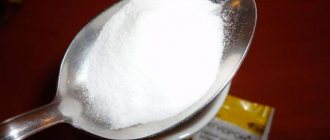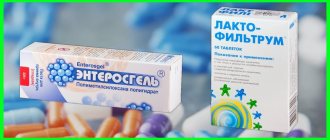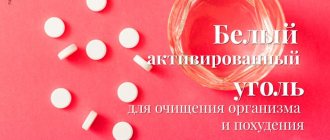Features of the infant's intestines
The intestines of a newborn baby and the intestines of an adult are different.
There are several differences:
- Their first difference is their structure. The intestines of a small child are longer than those of an adult. It is very mobile and sections of the intestine can enter each other. Most often, this is corrected by the body on its own.
- The baby's intestines are sterile. From the first days of life, it begins to actively fill with microorganisms and bacteria. Most bacteria are beneficial, but there are also opportunistic bacteria. If there are any changes in the intestinal mucosa, they can immediately become harmful and cause disruption of the intestinal microflora.
- The intestines of infants are more permeable compared to adults. Absorption into the blood occurs quickly, and substances that are excreted from the body in adults often enter the body, and thus Lactofiltrum often has to be given to infants.
In what cases should Lactofiltrum be given to infants?
The most common problem in infants is colic. The child is very restless, capricious, and cannot sleep. Sometimes doctors prescribe Lactofiltrum for a baby in complex therapy.
If the consistency, color and smell of stool changes, Lactofiltrum can also be taken to prevent intestinal dysbiosis, as well as to eliminate flatulence in infants.
Newborns also need to drink Lactofiltrum for various types of allergies. Food or medications can cause allergic reactions; to remove allergens from the body, you must take Lactofiltrum. Lignin absorbs all harmful substances and removes them. The allergy may persist for several days or more, and then the drug intake must be extended.
How to take the drug for infants
Lactofiltrum should be prescribed to infants by a pediatrician. It is necessary to strictly follow all the rules of administration, since the drug removes not only harmful substances, but also useful ones.
Infants need to take Lactofiltrum 1/4 tablet, or use the dosage form of Lactofiltrum powders, since an infant cannot swallow tablets. The tablet can be crushed if it is convenient for the mother.
As soon as problems with the intestines appear in a breastfed baby, the mother needs to analyze her diet and identify foods that provoke problems. Often, along with the child, the mother must also take Lactofiltrum. Such treatment is necessary to avoid the re-introduction of unnecessary products and bacteria into the baby’s body. In severe cases, breastfeeding must be stopped.
Lactofiltrum for newborns can be taken for 7-10 days. Then stop taking it. In cases of repeated dysbacteriosis, the drug should be taken no earlier than 3 weeks. It does not matter what dosage form is taken.
In the first year of a child's life, intestinal problems may appear periodically. You can take Lactofiltrum or its equivalent.
Found a mistake? Select it and press Ctrl + Enter
Children are often exposed to various allergic reactions, food poisoning or common digestive disorders, so sorbent products are prescribed to patients in this group quite often. Lactofiltrum is considered one of the effective drugs of this type.
Analogs
Medicines that are completely similar to Laktofiltrum are not produced, but if necessary, the doctor usually chooses to replace such tablets with similar drugs among other enterosorbents.
- "Enterosgel". This gel-like paste has strong sorbing properties due to its special porous matrix. The tasteless drug is approved from birth, and the sweet paste can be used in children older than one year.
- "Smecta". The action of this well-known sorbent is ensured by smectite, which is of natural origin. The medicine is considered effective and safe, therefore it is prescribed from birth for vomiting, diarrhea, bloating, allergies and other cases. Moms also like its portioned form, since Smecta is sold in sachets, inside of which there is either powder or a ready-made suspension.
- "Activated carbon". This popular adsorbent is capable of absorbing harmful substances with its active surface, therefore it is often used for poisoning, flatulence, toxic infections and other diseases. One of the main advantages of such a drug is its low cost and availability. It can be given to both infants and older children, for example, at 5-6 years old.
- "Polyphepan". The main ingredient of this powder is hydrolytic lignin, due to which the medicine has sorption properties. The drug is prescribed to children with burns, dyspepsia, allergies, poisoning and other ailments at any age.
- "Enterodesis." This medicine in the form of powder sachets is used from birth for various infections, kidney diseases and other pathologies. It works due to povidone, which is able to combine with toxic substances, causing them to leave the body faster.
- "Polysorb MP". This powder contains silicon dioxide, which can bind viral particles and various toxic substances. After mixing with water, it forms a suspension that is used in children of any age with food poisoning, diathesis, diarrhea and other problems.
For a review of the drug "Lactofiltrum", see the following video.
Dysbacteriosis in infants is a fairly common occurrence. Every mother has encountered manifestations of dysbacteriosis. Doctors often prescribe Lactofiltrum to infants. This drug eliminates the symptoms of dysbiosis and restores the intestinal microflora.
Indications
The number of children prone to allergic reactions is constantly growing, and Lactofiltrum helps remove toxins and allergens from the child’s body, while restoring the intestinal microflora.
This drug does not contain any components hazardous to children, so it is safe for young patients.
Indications for taking Lactofiltrum are:
- Children's dysbacteriosis;
- Functional gastrointestinal disorders;
- Colitis and various dermatitis;
- Dyspepsia and urticaria;
- Enteropathies of allergic origin;
- Infectious pathologies with intoxication symptoms;
- Intestinal infections, etc.;
- Lactofiltrum is also recommended for childhood poisoning of any origin and complexity, but only in combination with other drugs.
Overdose
If severe constipation and cutting pain in the stomach occur, there is a very high possibility of symptoms appearing due to an overdose of Lactofiltrum.
The drug is immediately discontinued, after which symptomatic therapy by a specialist is mandatory.
Failure to follow the manufacturer's and doctor's recommendations often leads to undesirable reactions. From the gastrointestinal tract, constipation and severe pain in the epigastric region may appear. There are also known cases of allergies in the form of itching and redness of the skin. If any atypical symptoms appear, you should stop taking the medication and consult a doctor.
Release form, composition and action
The drug is produced in tablet form, however, for children it may be recommended to take Lactofiltrum-Eco, which is produced in the form of lozenges or powders. Although both of these drugs have the same active ingredients, Lactofiltrum is a medicinal drug, but Lactofiltrum IVF is a bioactive additive.
The main active ingredients of the drug are lignin and lactulose, additional components are presented in the form of croscarmellose sodium and magnesium stearate.
It quickly binds and removes pathogens and toxic substances, allergens and heavy metal salts. Enterosorbent has a complex effect; it successfully normalizes the bacterial microflora of the large intestine.
Alcohol compatibility
The official instructions do not contain information about the possible effect of the drug on the body when used simultaneously with alcoholic beverages. Lactofiltrum is prescribed to eliminate intoxications of various degrees of complexity, as well as for hangovers. Active ingredients in the intestines bind poisons, toxins and dangerous breakdown products.
Lactofiltrum belongs to the inert group of drugs. Studies have confirmed the absence of traces of the drug in the blood plasma and spontaneous excretion through feces. The sorbent leaves the body on average after two days.
Unlike most analogues, the drug quickly restores normal microbiota. If there are symptoms of poisoning, the dosage should be increased to ten tablets. It is also recommended to take the sorbent before going to bed. To prevent a severe hangover, it is enough to take three tablets.
Instructions for use Lactofiltrum for children
According to the attached instructions, Lactofiltrum should be used with particular caution when treating children if the patients are under one year of age. Although in special cases the doctor may prescribe Lactofiltrum for such small children.
The dosage is selected by the doctor individually and depends on the age of the child.
- Children 1-3 years old are advised to take half a tablet;
- 3-7 year old children – 1 pill;
- 8-12 year old patients – 1-2 tablets;
- And for children over 12 years old, 2-3 pills.
Receptions should be carried out three times a day, about an hour before meals or any medications, washed down with plenty of water. If necessary, the tablets can be crushed to make them easier to swallow.
The duration of the therapeutic course is usually about 1.5-2 weeks, but the doctor selects the final treatment period individually.
If poisoning occurs, then Lactofiltrum should be taken three to four times a day.
Lactofiltrum Eco in powder form is most effective in the treatment of poisoning.
- Children under one year old should be given ¼ of the powder contents of the sachet;
- From 1-3 years, ¼-½ sachet of Lactofiltrum;
- For 4-7 year old children, the dosage is half a sachet at a time;
- 7-12 year old patients are advised to take ½ or one sachet of Lactofiltrum powder;
- Children aged 12-18 years are allowed to take 1-2 sachets of the drug at a time.
Reviews
Marina, Khabarovsk:
My daughter went to kindergarten, and we were faced with the unpleasant consequences of changing her diet, and she is also allergic. The rashes literally covered my baby's face like a continuous carpet. The pediatrician recommended drinking Enterosgel, but it didn’t suit us because of the unpleasant taste, my daughter simply spat it out. Then the doctor recommended Lactofiltrum. They took ½ tablet, I diluted it in a spoonful of water, they took it without disgust, which made me very happy. The pimples disappeared on the second day. Now I always have it in my first aid kit, just in case.
Anna, Moscow:
Once in the garden my son ate something that was not particularly fresh, I don’t understand how this happened, but half of our kindergarten came down with mild food poisoning. The child refused to eat, walked lethargically, periodically had a stomach ache, but did not vomit. As first aid, I decided to use Lactofiltrum, fortunately, these tablets are always in the medicine cabinet and have helped out all the members of our large family more than once. Within a couple of hours, my son felt noticeably better, and by evening we completely forgot about the poisoning. The next day we went to the doctor absolutely healthy.
Anastasia, Tver:
It’s a pity that I only became acquainted with Laktofiltrum when I became a mother for the second time. With our first daughter, for allergies or diathesis, or intestinal disorders, doctors for some reason recommended Enterosgel to us. They accepted it with battle and tears. And Lactofiltrum easily dissolves in water and does not cause disgust in the child. I even mixed the tablets with applesauce, and the baby ate everything without any problems. I am very pleased with the drug, for us, mothers, it is simply a salvation in difficult situations.
Side effects
Like any other drug, after taking Lactofiltrum, side reactions such as diarrhea or flatulence, atony of intestinal muscle tissue, or skin rashes and allergic reactions may also occur.
If Lactofiltrum is taken for too long, the absorption of calcium compounds and vitamin substances is disrupted.
Overdoses of the drug occur quite rarely, and the patient observes the occurrence of such manifestations as nausea and vomiting reactions, painful symptoms in the abdomen or constipation. As a treatment, you should stop taking the drug and undergo symptomatic treatment.
Conclusion
If, for one reason or another, you have problems with stool associated with diarrhea, you should not endure pain and discomfort. Take the dietary supplement Laktofiltrum, especially since it is not a drug and will not cause significant changes to your body. Be careful, be sure to read the instructions before taking. Only if you have no contraindications to taking it, and you clearly know your maximum dosage, can you try the effect of this drug for yourself. We, in turn, wish you good health.
Source
Contraindications
Lactofiltrum in any form is prescribed with special caution for the following conditions:
- Bleeding in the gastrointestinal structures;
- Hypersensitivity to individual components of Laktofiltrum;
- Intestinal obstruction;
- Galactosemia, represented by a congenital deficiency of enzyme activity, in which galactose accumulates in the bloodstream and is unable to be converted into glucose;
- Exacerbation of ulcerative processes in the duodenum or gastric cavity;
- In the presence of intestinal atony, which is characterized by a lack of tone of the smooth muscle tissue of the intestine.
When prescribing Lactofiltrum in pediatrics, it is necessary to take into account such contraindications, otherwise complications and the development of adverse reactions are possible.
Lactofiltrum for children is a combined medication. It adsorbs harmful compounds, including allergens, on its surface and accelerates their evacuation from the body, and also normalizes the microflora of the intestines and vagina. But in order for the medicine not to harm health, it is important to know how to give Lactofiltrum to infants and older children correctly.
During pregnancy
Lactofiltrum is not absorbed into the general bloodstream of the body and is excreted completely with feces. As a result, the drug should not cause harm to the fetus or child during breastfeeding. The experiments were carried out only on animals and had positive results.
A gynecologist or therapist can prescribe tablets to a pregnant or lactating woman to eliminate:
- severe toxicosis and normalization of appetite;
- infectious and colds, including intestinal infections;
- if you have constipation;
- to remove toxins in case of poisoning;
- headaches and fever due to a cold or sludge in the body.
The daily dosage of the drug is similar to the standard adult dose. The course of treatment should not exceed 7 days, regardless of the pathology. Since the product can additionally remove vitamins taken by a woman (necessary for normal fetal growth). Lactofiltrum is not used for prevention during pregnancy.
Action of the medicine
Laktofiltrum belongs to the enterosorbents. The effect of the drug is explained by its medicinal components.
Lignin is a natural enterosorbent. It consists of hydrolysis products of wood substances. Lignin, entering the intestine, adsorbs on its surface microorganisms, medications, heavy metal salts, ethyl alcohol, allergens, metabolic end products such as bilirubin, cholesterol, urea, biogenic amines and other compounds that can cause poisoning.
Lignin does not have a harmful effect, since it is not adsorbed and is completely evacuated from the body within 24 hours.
Lactulose is an artificial disaccharide that consists of galactose and fruit sugar molecules. It is released from the tablets in the colon. Here, lactulose is fermented by normal intestinal flora, substances are formed that serve as a nutrient medium for the growth of bifidobacteria and lactobacilli. Also, in the process of chemical reactions, lactate, ethanoic and methanoic acids are synthesized from the disaccharide, which stop the proliferation of pathogenic bacteria and reduce the formation of dangerous nitrogen-containing compounds. In addition, osmotic pressure in the colon increases, which stimulates intestinal motor function.
The action of the medication is aimed at normalizing the intestinal microflora and reducing the severity of poisoning by toxic compounds that form in the body.
Lactofiltrum for vaginal dysbiosis enhances the effects of other medications that are used to treat this disease, and it also suppresses the proliferation of opportunistic bacteria and fungi, and increases the number of lactobacilli.
Use for weight loss
It is believed that taking Lactofiltrum will help you lose excess weight. In fact, the drug does not have such an effect, and the decrease in volume occurs due to the removal of a number of toxic substances and toxins from the body.
When intestinal function is normalized, several kilograms will be lost, but fat deposits will definitely not be broken down.
At the same time, quite often during a diet it is recommended to take the drug, because it quickly removes all toxins after the breakdown of fat cells in the intestines. This will dramatically increase the effectiveness of dietary restriction without any disturbances in well-being.
While taking the medicine, it is imperative to limit the intensity of physical activity, because a number of unusual sensations are possible in the body during cleansing.
For weight loss, it is recommended to drink 9 tablets per day, divided into 3 doses for 14 days. Lactofiltrum should not be used for weight loss if you have diabetes or gastritis.
Interview with Gennady Malakhov about wax-cream Zdorov
“...I want to touch on one of the important topics of intimate illness. We will talk about hemorrhoids and their treatment at home...”
Read more{amp}gt;{amp}gt;{amp}gt;
Indications for use of Lactofiltrum for children
The instructions for the drug Lactofiltrum for children state that it can be used if the following pathologies are observed:
- intestinal dysbiosis of various origins, including those arising from taking antibiotics,
- allergy, which manifests itself as urticaria, atopic dermatitis.
In combination with other drugs, Lactofiltrum is recommended for children with irritable bowel syndrome, inflammation and cirrhosis of the liver.
In addition, adults and children can drink Lactofiltrum if they have vaginal dysbiosis.
Instructions for use of Lactofiltrum for a child
In order for the drug to be beneficial, you need to know how to take Lactofiltrum for children. The medicine should be taken an hour before meals and other medications. If it is difficult for a child to swallow a tablet, it must first be crushed into powder and given to the child in this form.
According to the instructions for use of the drug Lactofiltrum, the dosage for children depends on the age of the patient:
- for children aged 1 to 3 years, give ½ tablet,
- give preschoolers 3-7 years old 1 tablet,
- patients 8-12 take 1 or 2 tablets at a time,
- Adolescents over 12 years of age take 2 or 3 tablets per dose.
The frequency of taking Lactofiltrum for diarrhea in a child and other symptoms of dysbacteriosis, as well as other pathologies, is 3 times a day.
For vaginal dysbiosis, take the medicine 2 tablets three times a day.
Important information! It is not recommended to give lactofiltrum to a child who is vomiting, as it will have no effect. The medicine will come out in the vomit. If the patient is vomiting, he needs to drink a lot in small sips. Doctors recommend feeding the patient with saline solutions, for example, Regidron.
The course of therapy can vary from 14 to 21 days. Depending on the severity of the clinical picture, the doctor may extend the duration of treatment. Repeated use of the drug is possible only after consultation with a specialist.
To ensure that the medicine does not lose its therapeutic effect, it must be stored in a non-humid, dark place inaccessible to minors at a temperature of up to 30 degrees, for 36 months from the date of release of the medicine.
Contraindications and adverse reactions
Lactofiltrum should not be given to a child if he has the following pathologies:
- intolerance to the composition of the tablets,
- intestinal obstruction,
- bleeding from the digestive tract,
- recurrence of gastrointestinal ulcers,
- disturbance of galactose metabolism,
- decreased tone and intestinal motility.
Lactofiltrum is contraindicated for infants under 12 months of age.
The medication is well tolerated by most children, only sometimes the medication can cause bloating and allergies.
If therapeutic dosages are exceeded, symptoms of enterosorbent overdose may appear, such as constipation or abdominal pain. In case of poisoning with the drug, it is canceled; treatment is not required.
Alarming symptoms
Despite the fact that Lactofiltrum exhibits all the properties of an effective sorbent and microflora balance regulator, you should pay attention to alarming symptoms. They are a signal that medical attention is needed as quickly as possible.
These symptoms include:
- debilitating diarrhea that does not go away after taking the medicine;
- blood impurities in stool;
- black color of stool;
- rapid exhaustion;
- temperature increase;
- sharp pains and cramps in the abdomen;
- diarrhea accompanied by nausea and vomiting.
These are symptoms of acute conditions: poisoning, inflammatory, organic diseases of the digestive tract. In this condition, it is dangerous to take any medications until the cause of the pain is determined. Therefore, you need to seek medical help.
Prolonged diarrhea can cause dehydration; the patient needs to take clean water - at least a liter per hour - to restore water and electrolyte balance.











